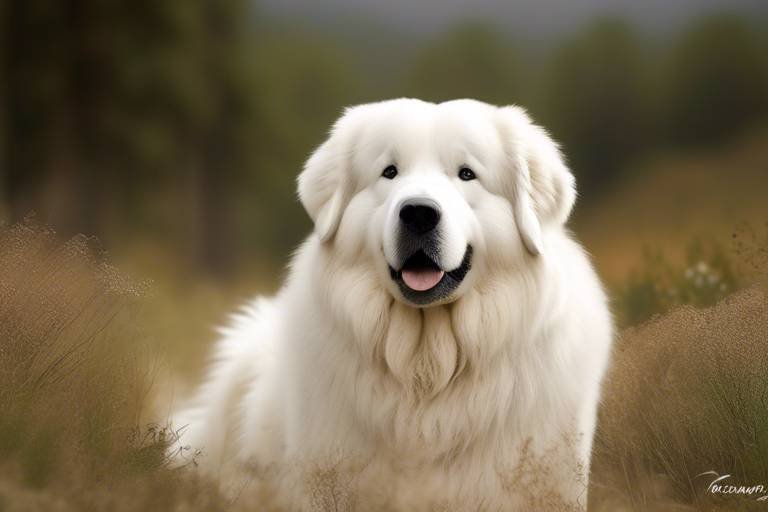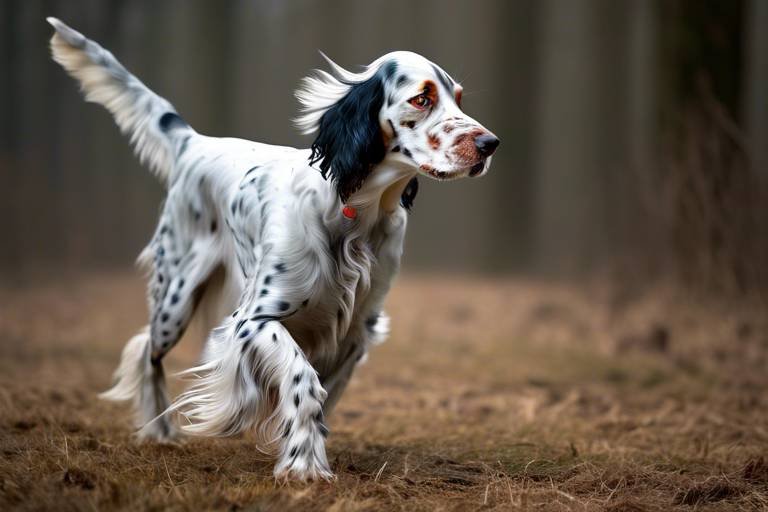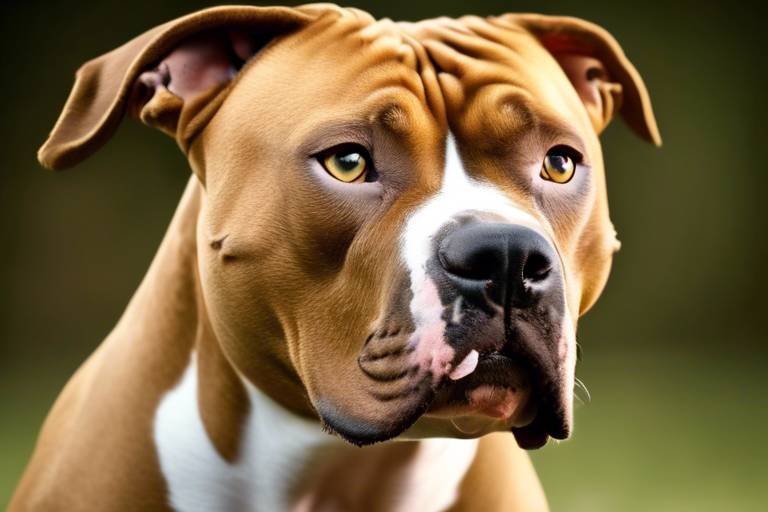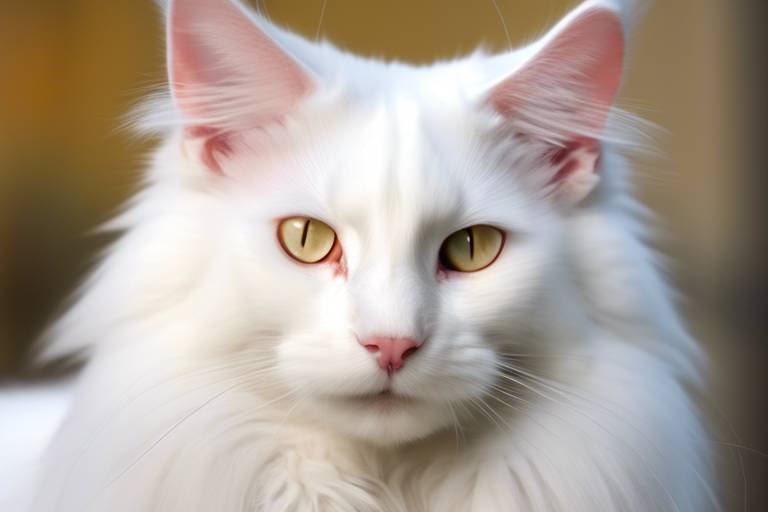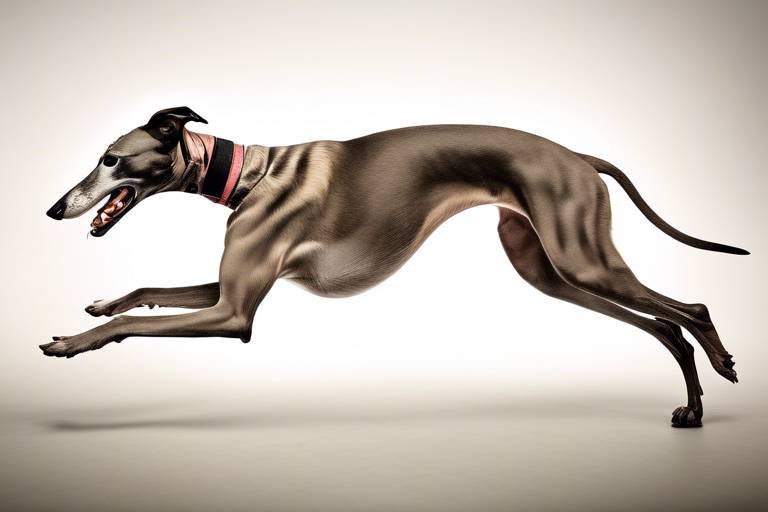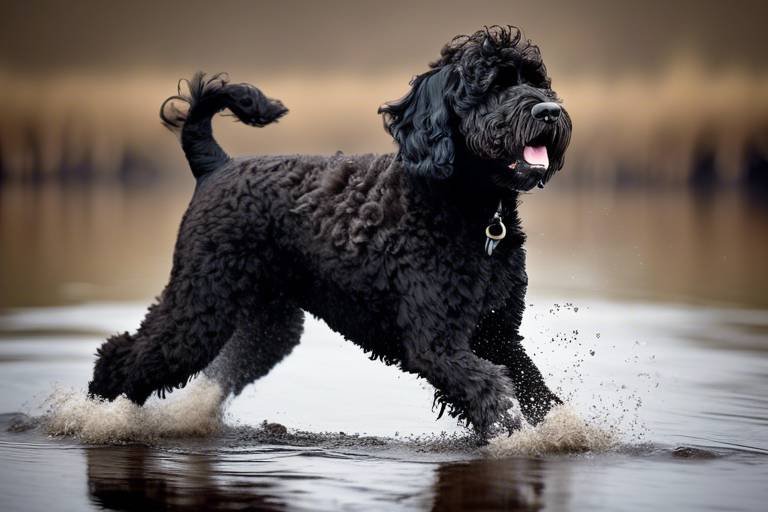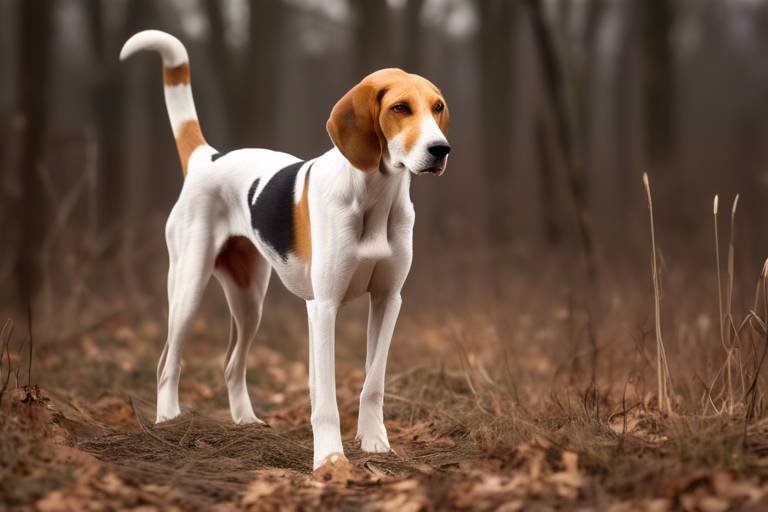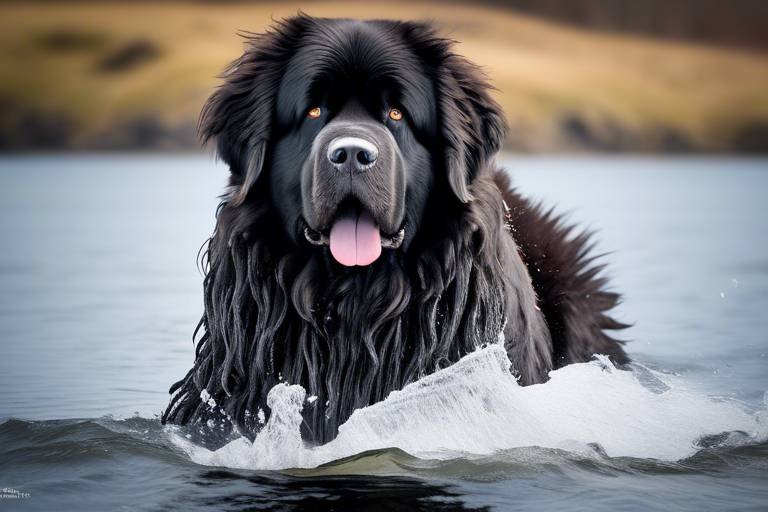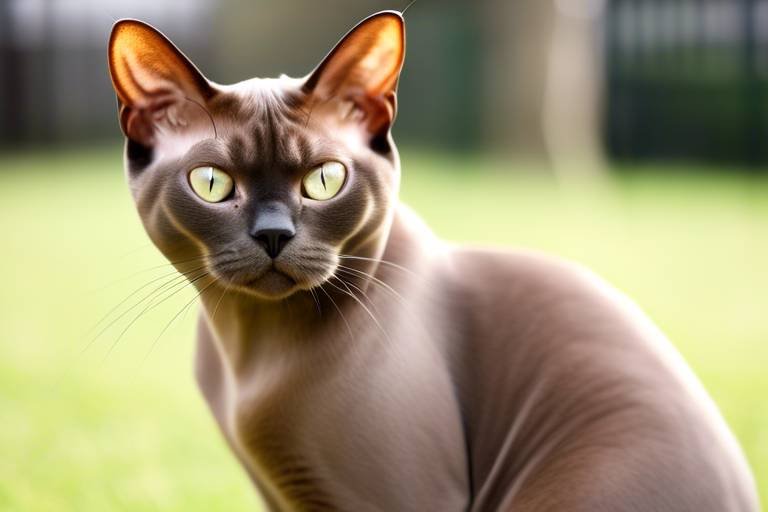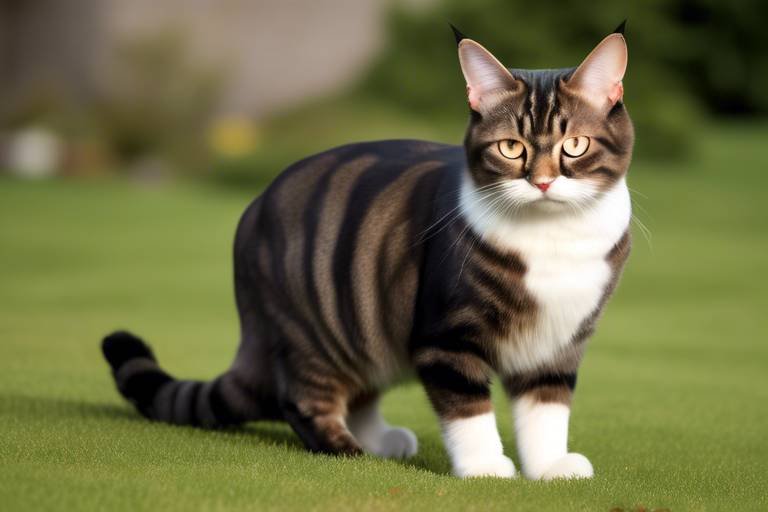The Gentle Nature of the Great Pyrenees
The Great Pyrenees, often affectionately called "Pyrs," are not just dogs; they are gentle giants that embody a unique blend of calmness and affection. Their stunning white coats and majestic stature can easily capture anyone's attention, but it’s their loving temperament that truly wins hearts. These dogs are known for their serene demeanor, making them an ideal addition to any family. Whether it’s snuggling on the couch or watching over the kids during playtime, the Great Pyrenees brings a sense of peace and warmth into a household.
One of the most fascinating aspects of the Great Pyrenees is their innate ability to sense emotions. They can often tell when someone is feeling down or anxious, and they will instinctively move closer, offering comfort with their gentle presence. This empathetic nature makes them not only great companions but also wonderful therapy dogs, capable of providing emotional support to those in need. It's almost as if they have a sixth sense, allowing them to bond deeply with their human counterparts.
In addition to their affectionate traits, Great Pyrenees are known for their protective instincts. Originally bred to guard livestock in the Pyrenees Mountains, these dogs have a long history of watching over what they hold dear. Their loyalty is unmatched, and they will go to great lengths to ensure the safety of their family. This combination of gentleness and vigilance makes them exceptional family pets, capable of nurturing and protecting loved ones simultaneously.
However, owning a Great Pyrenees comes with responsibilities. Understanding their unique characteristics is essential for anyone considering welcoming one of these gentle giants into their home. They require proper socialization, exercise, and grooming to thrive. With the right care, a Great Pyrenees can be a loyal friend for many years, enriching the lives of everyone in the family.
- Are Great Pyrenees good with children? Yes, they are known for their gentle and protective nature, making them excellent companions for children.
- How much exercise do they need? While they have a calm demeanor, they still require regular exercise, including daily walks and playtime.
- Do they shed a lot? Yes, Great Pyrenees have a thick double coat that sheds, especially during seasonal changes, requiring regular grooming.
- What health issues are common in Great Pyrenees? They can be prone to hip dysplasia and certain heart conditions, so regular veterinary check-ups are essential.

Temperament Overview
The Great Pyrenees is often described as a gentle giant, embodying a calm and affectionate demeanor that makes them a cherished family pet. These dogs are not just big in size; they are also big in heart. Their temperament is characterized by a mix of loyalty, protectiveness, and an innate ability to connect with their human companions. Imagine having a fluffy cloud of love that not only watches over your family but also snuggles up next to you after a long day. That’s the Great Pyrenees for you!
One of the most remarkable aspects of their temperament is their laid-back nature. While they are certainly capable of being active and playful, they are equally content lounging around the house. This balance makes them ideal companions for families with children, as they can engage in playful antics one moment and then settle down for a cozy cuddle the next. Their patient and gentle approach to playtime ensures that they are not just a source of entertainment but also a comforting presence.
However, it’s essential to recognize that the Great Pyrenees also possesses a strong protective instinct. This breed was originally developed as a livestock guardian, and this history contributes to their natural vigilance. They are known to be watchful and alert, making them excellent watchdogs. When they perceive a potential threat, their protective nature kicks in, and they will not hesitate to defend their family and home. This instinct, combined with their affectionate nature, creates a unique dynamic where they can be both a loving companion and a steadfast guardian.
Socialization plays a crucial role in shaping the temperament of a Great Pyrenees. Early exposure to various environments, people, and animals is vital for helping them develop into well-rounded dogs. Without proper socialization, their protective instincts can lead to wariness or even aggression towards strangers. Therefore, it’s important for potential owners to engage their Great Pyrenees in social activities from a young age. This can include trips to the park, visits to friends’ homes, and interactions with other pets. The more experiences they have, the more balanced and friendly they will become.
In summary, the Great Pyrenees is a breed that combines a gentle disposition with strong protective instincts. Their calm and affectionate nature makes them wonderful family pets, while their vigilant traits ensure that they remain loyal guardians. Understanding these characteristics is key for any potential owner, as it allows them to appreciate the unique blend of qualities that make the Great Pyrenees such a beloved breed.
- What is the average temperament of a Great Pyrenees? They are known for being calm, affectionate, and protective.
- Do Great Pyrenees require a lot of socialization? Yes, early socialization is essential to ensure they develop a balanced personality.
- Are Great Pyrenees good with children? Absolutely! Their gentle nature makes them excellent companions for kids.

History and Origins
The Great Pyrenees, a majestic breed known for its stunning white coat and gentle demeanor, has a rich history that dates back thousands of years. Originally bred in the rugged Pyrenees Mountains of France and Spain, these dogs were primarily used as livestock guardians. Their primary role was to protect sheep from predators such as wolves and bears, showcasing their incredible loyalty and protective instincts. This history has not only shaped their physical characteristics but has also deeply influenced their temperament and behavior.
As you explore the origins of the Great Pyrenees, it becomes clear that their nurturing instincts are a product of their environment. The harsh conditions of the mountains required these dogs to be both brave and calm, ensuring they could effectively guard their flocks while remaining gentle enough to bond with the sheep they protected. This duality is what makes the Great Pyrenees such a unique breed, blending strength with tenderness.
Interestingly, the breed's history is intertwined with the local culture of the regions they hail from. The Pyrenees are not just a geographical feature; they are a way of life for the people who inhabit them. Farmers relied heavily on the Great Pyrenees, and in return, these dogs developed a strong bond with their human counterparts. This relationship fostered a sense of loyalty that persists in the breed today.
Throughout history, the Great Pyrenees have also been recognized for their noble appearance and gentle nature, which made them popular not just as working dogs but also as family companions. Their majestic stature and soft expression have captured the hearts of many, leading to their adoption beyond the confines of farms and into homes across the globe.
In modern times, while they are still used in some regions for their original purpose, the Great Pyrenees have found a new role as family pets and therapy dogs. Their ability to form deep emotional connections with humans makes them ideal companions, especially for families with children. This transition from working dogs to cherished family members exemplifies their adaptability and enduring appeal.
To truly appreciate the Great Pyrenees, one must understand not only their past but also how it shapes their present. Below is a brief overview of their historical journey:
| Period | Significance |
|---|---|
| Ancient Times | Used as livestock guardians in the Pyrenees Mountains. |
| Middle Ages | Recognized for their loyalty and protective instincts. |
| 19th Century | Gained popularity as family pets and show dogs. |
| Modern Day | Serves as both guardians and affectionate companions. |
In conclusion, the history and origins of the Great Pyrenees are a testament to their incredible adaptability and enduring loyalty. Whether they are guarding livestock or cuddling on the couch, these dogs carry with them a legacy of love and protection that continues to thrive in homes today.
Working Dogs
The Great Pyrenees, often affectionately called "Pyrs," were not just bred for their good looks; they were developed as with an impressive set of skills. Imagine standing on a vast mountain range, surrounded by rolling hills and flocks of sheep—this is the natural habitat where these majestic dogs thrived for centuries. Their primary role was to protect livestock from predators, and they did so with a combination of strength, intelligence, and an innate sense of duty.
What sets the Great Pyrenees apart from other breeds is their unique approach to guarding. Unlike more aggressive breeds, Pyrs are known for their calm and composed demeanor. They don’t rush into situations; instead, they assess threats with a watchful eye. This guardian instinct is deeply ingrained in their DNA, making them incredibly effective watchdogs. When a threat arises, they are not just protectors; they become a shield for their flock, ready to confront danger with courage.
But their working abilities don’t end there. The Great Pyrenees are also known for their remarkable independence. They often prefer to make decisions on their own, which can sometimes be mistaken for stubbornness. In reality, this trait is a testament to their intelligence and confidence. They are not just following orders; they are evaluating the situation and acting accordingly. This independent spirit allows them to work effectively in the vast, open spaces where they were originally employed, ensuring that they can cover large areas and respond to threats without constant supervision.
Moreover, the Great Pyrenees have a gentle side, making them wonderful companions as well. Their nurturing instincts extend beyond livestock; they often develop strong bonds with both humans and other animals. This duality—being both a fierce protector and a loving companion—makes them a unique breed in the canine world. Whether they're patrolling the fields or lounging with the family, Pyrs showcase an incredible blend of strength and affection.
As we delve deeper into their working traits, it's essential to recognize that these dogs thrive on having a job to do. They need mental stimulation and physical activity to keep their spirits high. Engaging them in tasks, whether it’s guarding the yard or participating in obedience training, can harness their working instincts positively. Just as a child thrives on learning and exploration, the Great Pyrenees flourishes when given responsibilities that challenge their intellect and instincts.
In summary, the Great Pyrenees are not merely pets; they are working dogs with a rich heritage of guarding and protecting. Their combination of independence, intelligence, and gentle nature makes them not only excellent guardians but also cherished family members. Understanding their working background helps potential owners appreciate the unique qualities that these dogs bring into a household.
- What is the average lifespan of a Great Pyrenees? The average lifespan is around 10 to 12 years, although some may live longer with proper care.
- Do Great Pyrenees shed a lot? Yes, they have a thick double coat that sheds seasonally, requiring regular grooming to manage.
- Are Great Pyrenees good with children? Absolutely! They are known for their gentle and affectionate nature, making them great companions for kids.
- How much exercise do they need? They require regular exercise, including daily walks and playtime, to stay healthy and happy.
- Can they be left alone for long periods? While they are independent, they thrive on companionship and should not be left alone for extended periods.
Guardian Instincts
The Great Pyrenees is not just a fluffy companion; they are born guardians, and their instincts run deep. These majestic dogs were originally bred to protect livestock in the rugged terrain of the Pyrenees Mountains, and that role has shaped their character profoundly. Imagine having a guardian who is not only vigilant but also incredibly gentle—this is the essence of the Great Pyrenees.
One of the most remarkable aspects of their guardian instincts is their natural vigilance. These dogs have an innate ability to sense potential threats, whether it be a stranger approaching or an unusual noise in the night. Their watchful nature makes them excellent watchdogs, as they are always on alert, ready to defend their family and territory. This protective behavior is not just instinctual; it is a product of their history, where they had to fend off predators and protect their flock from harm.
What sets the Great Pyrenees apart from other breeds is their calm demeanor combined with their protective instincts. While they are alert, they are not aggressive. Instead, they tend to assess situations before reacting. This thoughtful approach allows them to be both loving companions and effective guardians. When a stranger approaches, they may bark to alert their family, but they will not rush in with aggression unless absolutely necessary. This balance makes them ideal for families, as they provide a sense of security without being overly intimidating.
Socialization plays a crucial role in shaping their guardian instincts. Early exposure to various environments, people, and animals helps them develop a well-rounded personality. This means that while they are protective, they are also friendly and approachable. It's fascinating how a well-socialized Great Pyrenees can be both a gentle giant and a fierce protector. They tend to form strong bonds with their family, making them even more dedicated to their protective role.
In terms of their physical presence, the Great Pyrenees is hard to miss. Their large size and thick, fluffy coat not only make them look formidable but also add to their protective aura. However, it's essential to remember that their size is matched by their heart. They have a nurturing side that shines through in their interactions with children and other pets. This duality of being both a gentle giant and a fierce guardian makes them unique in the canine world.
In conclusion, the guardian instincts of the Great Pyrenees are a blend of vigilance, calmness, and affection. They are not just dogs; they are protectors who take their role seriously while still being loving companions. Their ability to guard without aggression is what makes them so special, ensuring that families can feel safe and secure in their presence.
- Are Great Pyrenees good with children? Yes, Great Pyrenees are known for their gentle nature and can be excellent companions for children.
- Do they require a lot of exercise? While they are calm, they still need regular exercise to stay healthy and happy.
- How often should they be groomed? Due to their thick double coat, regular grooming is essential, ideally a few times a week.
- Are they easy to train? Great Pyrenees can be independent thinkers, so consistent training and positive reinforcement are key.
Socialization Needs
When it comes to the Great Pyrenees, socialization is not just a luxury—it's a necessity. These gentle giants, with their calm demeanor, thrive in environments where they are exposed to a variety of experiences, people, and animals. Think of it like this: just as a flower needs sunlight and water to bloom, a Great Pyrenees needs social interaction to truly flourish. If they are not properly socialized, their natural instincts may lead them to be overly protective or reserved, which can create challenges in a family setting.
Starting the socialization process early in their life is crucial. Puppies are like sponges, absorbing everything around them. This is the ideal time to introduce them to different situations, such as:
- Meeting new people, including children and the elderly
- Interacting with various animals, from dogs to cats
- Experiencing different environments, such as parks, busy streets, and quiet neighborhoods
By ensuring your Great Pyrenees is exposed to diverse stimuli, you help them develop a balanced personality. A well-socialized Great Pyrenees will be more confident and less anxious, making them not only a better companion but also a more effective guardian. It's essential to remember that every experience should be positive. Use treats, praise, and gentle encouragement to reinforce good behavior during these interactions. If they encounter something that frightens them, it’s crucial to handle it calmly and reassuringly, allowing them to explore at their own pace.
Moreover, socialization doesn't stop once your pup reaches adulthood. Continuing to expose your Great Pyrenees to new experiences throughout their life helps maintain their social skills. Regular visits to dog parks or participating in community events can provide opportunities for interaction. Remember, a socialized Great Pyrenees is not only a happier dog but also a more adaptable one, capable of handling the ups and downs of family life.
In summary, investing time in socializing your Great Pyrenees is an investment in their happiness and your peace of mind. The more well-rounded they are, the more they can showcase their affectionate and protective nature without the anxiety that can sometimes accompany unfamiliar situations.
Q: How early should I start socializing my Great Pyrenees?
A: It's best to start socializing them as early as 7 to 8 weeks old. This is when they are most receptive to new experiences.
Q: What if my Great Pyrenees is fearful of other dogs?
A: Gradual exposure is key. Start with calm, friendly dogs and allow your dog to approach at their own pace. Positive reinforcement can help build their confidence.
Q: Can adult Great Pyrenees still be socialized?
A: Absolutely! While it may take more time and patience, adult dogs can learn to adapt and become more social with consistent exposure and positive experiences.
Family Companionship
The Great Pyrenees is not just a dog; they are a loving member of the family. Their affectionate nature makes them ideal companions for both children and adults, enriching family dynamics in remarkable ways. Imagine coming home after a long day, and there they are, tail wagging and eyes sparkling with joy, ready to greet you. This breed forms deep bonds with family members, often displaying a gentle and nurturing temperament that makes them particularly great around kids. They have an innate ability to sense the moods of those around them, providing comfort when needed and joy during playtime.
One of the most heartwarming aspects of having a Great Pyrenees is their protective yet gentle demeanor. They naturally take on the role of a guardian, not just for your home but for your loved ones as well. Their presence can be incredibly reassuring, especially for families with young children. The Great Pyrenees is known for being patient and tolerant, often allowing kids to climb over them or snuggle up without a fuss. This gentle giant is a true companion, always ready to lend a paw or a warm body to lean on.
Moreover, incorporating a Great Pyrenees into family activities can create lasting memories. Whether it’s a family hike, a day at the park, or simply lounging on the couch, these dogs thrive on spending quality time with their humans. They encourage a more active lifestyle, as their need for regular exercise aligns perfectly with family outings. Just picture a sunny day, your kids running around, and your Great Pyrenees happily trotting alongside them, ensuring they stay safe while having fun.
However, it’s essential to remember that like any other breed, the Great Pyrenees needs to be socialized properly to ensure they develop a friendly and balanced personality. Early exposure to various environments, people, and animals helps them become well-adjusted companions. This breed's affectionate nature can sometimes be misunderstood as a lack of independence, but in reality, they are incredibly loyal and protective, always keeping a watchful eye on their family.
In summary, the Great Pyrenees is more than just a pet; they are a dedicated family member who brings joy, love, and a sense of security to the household. Their ability to form deep emotional connections with family members makes them a cherished addition to any home. If you're considering bringing one into your life, prepare for a journey filled with affection, loyalty, and countless heartwarming moments.
- Are Great Pyrenees good with children? Yes, they are known for their gentle and protective nature, making them great companions for kids.
- Do they require a lot of exercise? While they are calm, Great Pyrenees do need regular exercise to stay healthy and happy.
- How much grooming do they need? Regular grooming is essential due to their thick double coat to prevent matting and reduce shedding.
- Are they good watchdogs? Absolutely! Their natural guardian instincts make them excellent watchdogs.
- What health issues should I be aware of? Common health issues include hip dysplasia and certain heart conditions, so regular vet check-ups are important.

Care Requirements
Caring for a Great Pyrenees is a rewarding experience that requires attention to their specific needs to ensure they thrive both physically and emotionally. These magnificent dogs, with their thick double coats and gentle demeanor, need a combination of grooming, exercise, and proper nutrition to stay healthy and happy. It's essential to understand that while they may appear calm and relaxed, they still require a structured routine that caters to their natural instincts and well-being.
First and foremost, grooming is a critical aspect of their care. Great Pyrenees possess a dense double coat that helps them adapt to various weather conditions. Regular grooming, ideally once or twice a week, is necessary to prevent matting and reduce shedding. During shedding season, which typically occurs in spring and fall, you may need to increase grooming sessions to daily to keep their coat in top condition. This not only keeps their fur healthy but also minimizes the amount of dog hair around your home.
When grooming your Great Pyrenees, it's important to use the right tools. A slicker brush and a metal comb are excellent choices for maintaining their coat. Additionally, bathing should be done sparingly—perhaps every few months or as needed—since over-bathing can strip their coat of essential oils. Remember, grooming is not just about appearance; it also provides an opportunity to check for any skin issues or parasites that might otherwise go unnoticed.
Exercise is another vital requirement for these dogs. Despite their laid-back nature, Great Pyrenees need regular physical activity to maintain a healthy weight and mental stimulation. Daily walks, playtime in a secure yard, and engaging in interactive games can help satisfy their exercise needs. Aim for at least an hour of activity each day, but be mindful of their natural tendency to be independent. They may not always be eager to fetch a ball, but they will enjoy leisurely strolls where they can explore their surroundings at their own pace.
In addition to grooming and exercise, providing a well-balanced diet is crucial for the overall health of your Great Pyrenees. Quality dog food, whether commercial or home-cooked, should be rich in protein and tailored to their age, size, and activity level. Regular feeding times and portion control will help prevent obesity, which is a common concern in this breed. Always consult with your veterinarian to determine the best dietary plan for your furry friend.
Lastly, it’s important to create a safe and comfortable living environment for your Great Pyrenees. These dogs thrive on companionship and should not be left alone for extended periods. They are known for their loyalty and protective instincts, so providing them with a secure space where they can relax and feel at home is essential. Whether it’s a cozy bed in a family room or a designated area in the yard, ensuring they have a comfortable space will contribute to their overall happiness.
In summary, caring for a Great Pyrenees involves a blend of grooming, exercise, proper nutrition, and a loving environment. By understanding and meeting these care requirements, you can foster a strong bond with your furry companion and enjoy a fulfilling life together.
- How often should I groom my Great Pyrenees? It's recommended to groom them at least once a week, and more frequently during shedding seasons.
- What type of diet is best for a Great Pyrenees? A high-quality dog food rich in protein is ideal, tailored to their age and activity level.
- Do Great Pyrenees need a lot of exercise? Yes, they require at least an hour of exercise daily to stay healthy and mentally stimulated.
- Are Great Pyrenees good with children? Absolutely! They are known for their gentle and protective nature, making them excellent family pets.
- How can I ensure my Great Pyrenees is well-socialized? Expose them to various environments, people, and animals from a young age to help them develop a friendly personality.
Grooming Essentials
Caring for a Great Pyrenees is not just about love and attention; it also involves a significant commitment to grooming. With their thick double coat, these majestic dogs require regular grooming to keep their fur healthy and reduce shedding. Imagine trying to maintain a beautiful, fluffy cloud—this is essentially what you’re doing when you groom a Great Pyrenees! Their coat is designed to protect them from harsh weather, but it also means that without proper care, it can easily become matted and tangled.
One of the most important aspects of grooming is brushing. It’s recommended to brush your Great Pyrenees at least once a week, but during shedding season, which typically occurs in spring and fall, you might need to ramp this up to every few days. A slicker brush or an undercoat rake is ideal for managing their thick fur. Not only does regular brushing help to remove loose hair and dirt, but it also distributes natural oils throughout their coat, keeping it shiny and healthy. Think of it as giving your dog a mini spa day every week!
Bathing is another crucial part of the grooming routine, but it should be done sparingly—around every three months is usually sufficient. Over-bathing can strip their coat of essential oils, leading to dryness and irritation. When you do bathe your Great Pyrenees, use a gentle, dog-specific shampoo to avoid any skin issues. After bathing, ensure that you dry them thoroughly, especially in colder months, as they can easily get chilled when wet.
Regular nail trimming is also essential. Long nails can be uncomfortable for your dog and may lead to joint issues over time. Aim to trim their nails every few weeks, or whenever you hear them clicking on the floor. If you're unsure how to do this safely, consult your veterinarian or a professional groomer for guidance.
Lastly, don’t forget about dental care! Just like humans, dogs need their teeth cleaned to prevent dental diseases. Aim to brush your Great Pyrenees' teeth a few times a week, and consider providing dental chews to help keep their teeth clean and healthy.
In summary, grooming your Great Pyrenees is an essential part of ensuring they remain healthy and happy. By dedicating time to their grooming needs, you’ll not only enhance their appearance but also strengthen the bond you share with them. After all, a well-groomed dog is a happy dog!
- How often should I groom my Great Pyrenees? Regular brushing is recommended at least once a week, with increased frequency during shedding seasons.
- Can I bathe my Great Pyrenees too often? Yes, bathing should be done every three months to avoid stripping their coat of essential oils.
- What tools do I need for grooming? A slicker brush, undercoat rake, dog shampoo, nail clippers, and a toothbrush are essential grooming tools.
- How can I keep my Great Pyrenees' teeth healthy? Regular brushing and dental chews can help maintain good dental hygiene.
Exercise Needs
The Great Pyrenees, despite their calm and gentle demeanor, are not the type of dogs that can be left to lounge around all day without any activity. These majestic dogs require a balanced routine of exercise to maintain their physical health and mental well-being. Think of them as the gentle giants who, while they may appear to be lazy at times, have an inner athlete just waiting to be unleashed! Regular exercise not only helps keep them fit but also provides an outlet for their natural instincts and energy.
Daily walks are essential for the Great Pyrenees. A brisk stroll around the neighborhood or a leisurely hike in the park will do wonders for their mood and overall health. Aim for at least 30 to 60 minutes of exercise each day. This can be broken down into shorter sessions, which is particularly helpful if your schedule is tight. Additionally, incorporating playtime into their routine is crucial. Engaging them in games like fetch or tug-of-war can stimulate their minds and strengthen your bond.
It's important to remember that the Great Pyrenees are working dogs at heart. Their history as livestock guardians means they thrive on having a job to do. This can include activities such as:
- Participating in agility training
- Learning new tricks
- Helping with chores around the yard
Providing mental stimulation is just as vital as physical exercise. Puzzle toys and interactive games can keep their minds sharp and prevent boredom, which can lead to destructive behaviors. Think of it like a workout for their brain! The more you engage their minds, the happier and more balanced they will be.
In conclusion, while the Great Pyrenees may seem like couch potatoes at first glance, they require a consistent exercise routine to stay healthy and happy. By incorporating regular walks, playtime, and mental challenges into their daily life, you’ll ensure that your Great Pyrenees remains a joyful and well-adjusted member of your family.
Q: How much exercise does a Great Pyrenees need daily?
A: They typically need about 30 to 60 minutes of exercise each day, which can include walks and playtime.
Q: Can Great Pyrenees adapt to apartment living?
A: While they can adapt, it’s essential to provide them with adequate exercise and mental stimulation to prevent boredom.
Q: What types of activities do Great Pyrenees enjoy?
A: They enjoy walks, playtime, agility training, and any activities that involve problem-solving or tasks.
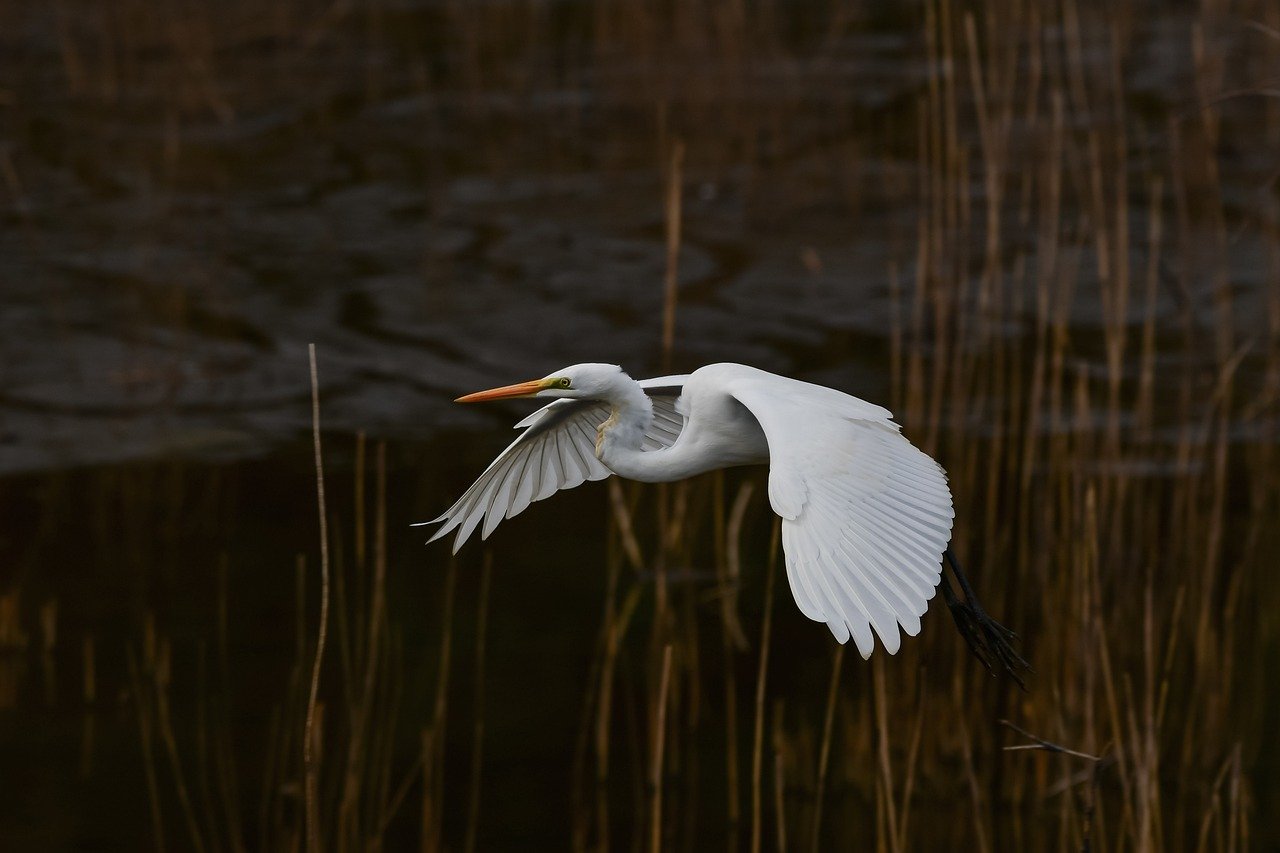
Health Considerations
Caring for a Great Pyrenees goes beyond just providing food and shelter; it encompasses a deep understanding of their health needs. Like all breeds, the Great Pyrenees is prone to specific health issues that can affect their quality of life. Being aware of these conditions is crucial for any owner looking to provide the best possible care for their furry friend. Regular veterinary check-ups are not just a suggestion; they are an essential part of ensuring your Great Pyrenees stays healthy and happy. These check-ups allow for early detection of potential health issues, which can significantly improve the outcome of treatments.
One of the most common health concerns in the Great Pyrenees is hip dysplasia. This genetic condition occurs when the hip joint doesn’t fit into the hip socket properly, leading to arthritis and pain. It’s vital to monitor your dog for signs of discomfort, such as reluctance to play or difficulty standing up after resting. Regular exercise can help maintain a healthy weight, reducing stress on their joints.
Another condition to be aware of is heart disease, specifically dilated cardiomyopathy, which affects the heart muscle and can lead to congestive heart failure. Symptoms may include a persistent cough, lethargy, or difficulty breathing. Routine veterinary exams often include heart screenings, which can help catch any issues early on.
To give you a clearer picture of some common health issues to watch for, here’s a quick overview:
| Health Issue | Description | Symptoms |
|---|---|---|
| Hip Dysplasia | A genetic condition affecting the hip joint. | Difficulty standing, reluctance to play, limping. |
| Heart Disease | Conditions affecting the heart muscle, such as dilated cardiomyopathy. | Coughing, lethargy, difficulty breathing. |
| Obesity | Excess weight can lead to various health problems. | Decreased energy, difficulty moving, excessive panting. |
Preventive care is another crucial aspect of keeping your Great Pyrenees healthy. This includes staying up-to-date with vaccinations, which protect against various diseases, and regular health screenings that can identify potential issues before they become serious. Additionally, maintaining a balanced diet tailored to their specific needs is vital for their overall health. A diet rich in nutrients can help prevent obesity, which is a growing concern in many breeds, including the Great Pyrenees.
Lastly, don’t forget about dental health! Just like humans, dogs can suffer from dental issues that can lead to more significant health problems if left untreated. Regular teeth brushing and dental check-ups can go a long way in ensuring your Great Pyrenees has a healthy mouth and, consequently, a healthier body.
- What is the average lifespan of a Great Pyrenees?
The average lifespan is typically between 10 to 12 years, but with proper care, some can live longer. - How often should I take my Great Pyrenees to the vet?
Annual check-ups are recommended, but more frequent visits may be necessary as they age or if health issues arise. - What vaccinations does my Great Pyrenees need?
Common vaccinations include rabies, distemper, parvovirus, and bordetella. Always consult your vet for a personalized vaccination schedule.
Common Health Issues
The Great Pyrenees, while known for their gentle nature and affectionate demeanor, are not immune to certain health issues that can affect their quality of life. As a responsible pet owner, being aware of these potential health concerns is crucial for ensuring your furry friend remains healthy and happy. One of the most common issues in this breed is hip dysplasia, a genetic condition where the hip joint doesn’t fit into the hip socket properly. This can lead to arthritis and significant discomfort as they age. Regular veterinary check-ups can help monitor their joint health and catch any early signs of this condition.
Another concern is cardiac issues, particularly dilated cardiomyopathy (DCM). This condition affects the heart muscle, reducing its ability to pump blood effectively. Symptoms may include lethargy, coughing, and difficulty breathing. Early detection through routine screenings can significantly improve the management of this condition.
Additionally, Great Pyrenees are prone to skin conditions, such as allergies and hot spots. Their thick double coat can trap moisture and dirt, leading to skin irritations if not properly maintained. Regular grooming is essential not only for their appearance but also for their skin health. Owners should be vigilant for signs of scratching or excessive licking, which can indicate discomfort or allergies.
To summarize, here are some of the common health issues to watch for in your Great Pyrenees:
- Hip Dysplasia - A genetic condition affecting hip joint alignment.
- Cardiac Issues - Including dilated cardiomyopathy, which can lead to heart failure.
- Skin Conditions - Such as allergies and hot spots due to their thick coat.
By being proactive and attentive to these health issues, you can help your Great Pyrenees live a longer, healthier life. Regular visits to the veterinarian, a nutritious diet, and proper exercise will go a long way in preventing and managing these conditions.
Q: How often should I take my Great Pyrenees to the vet?
A: Regular check-ups are recommended at least once a year, but more frequent visits may be necessary as they age or if any health issues arise.
Q: What is the average lifespan of a Great Pyrenees?
A: The average lifespan is around 10 to 12 years, but with proper care, some can live longer.
Q: Are Great Pyrenees prone to obesity?
A: Yes, they can be prone to obesity, so it’s important to monitor their diet and ensure they get regular exercise.
Q: How can I maintain my Great Pyrenees' coat health?
A: Regular grooming, including brushing at least once a week, will help remove loose fur and prevent matting.
Preventive Care
This article explores the affectionate and calm temperament of the Great Pyrenees, highlighting their unique characteristics, care needs, and the role they play as both companions and guardians.
The Great Pyrenees is known for its gentle and laid-back demeanor, making it a beloved family pet. Understanding their temperament helps potential owners appreciate their calm and protective nature.
The breed's rich history as a livestock guardian in the Pyrenees Mountains contributes to its loyal disposition. Discovering their origins provides insight into their nurturing instincts and protective behaviors.
Originally bred to guard sheep, the Great Pyrenees excels in protective roles. Their instinctual behaviors as working dogs influence their interactions with humans and other animals.
The breed's strong guardian instincts make them excellent watchdogs. Their protective nature ensures the safety of their family and property, showcasing their loyalty and vigilance.
Proper socialization is crucial for the Great Pyrenees to thrive. Early exposure to various environments, people, and animals helps them develop a balanced and friendly personality.
The Great Pyrenees is known for forming deep bonds with family members. Their affectionate nature makes them ideal companions for children and adults alike, enhancing family dynamics.
Caring for a Great Pyrenees involves understanding their grooming, exercise, and nutritional needs. Proper care ensures they remain healthy, happy, and well-adjusted as family pets.
Regular grooming is essential due to their thick double coat. Understanding the grooming process helps maintain their coat health and reduces shedding, contributing to a clean home environment.
Despite their calm demeanor, the Great Pyrenees requires regular exercise to stay fit and mentally stimulated. Daily walks and playtime are vital for their overall well-being.
Like all breeds, the Great Pyrenees is prone to specific health issues. Awareness of these conditions can aid in preventive care and ensure a longer, healthier life for your pet.
Understanding common health problems, such as hip dysplasia and certain heart conditions, is crucial for owners. Regular veterinary check-ups can help catch issues early and maintain their health.
Preventive care is the cornerstone of a healthy life for your Great Pyrenees. Just like we humans go for our annual check-ups, these gentle giants require regular veterinary visits to monitor their health and catch any potential issues early. Vaccinations are crucial in protecting them from various diseases, and keeping their parasite prevention up-to-date ensures they remain free from fleas, ticks, and worms.
In addition to routine vet visits, it’s essential to maintain a balanced diet tailored to their specific needs. A nutritious diet not only supports their overall health but also strengthens their immune system. Here's a quick overview of key preventive measures:
| Preventive Care Aspect | Recommended Frequency |
|---|---|
| Veterinary Check-ups | Annually |
| Vaccinations | As recommended by vet |
| Dental Care | Regular brushing and vet checks |
| Flea and Tick Prevention | Monthly |
| Exercise | Daily |
Furthermore, keeping an eye on their weight is vital, as obesity can lead to numerous health problems. If you notice any changes in behavior, appetite, or energy levels, don’t hesitate to consult your vet. Remember, an ounce of prevention is worth a pound of cure!
- How often should I groom my Great Pyrenees? Regular grooming is recommended at least once a week to maintain their coat and minimize shedding.
- Are Great Pyrenees good with children? Yes, they are known for their gentle and protective nature, making them great companions for kids.
- What is the average lifespan of a Great Pyrenees? They typically live between 10 to 12 years with proper care.
- Do they require a lot of exercise? While they are calm, they still need daily exercise to stay healthy and happy.
Frequently Asked Questions
- What is the temperament of the Great Pyrenees?
The Great Pyrenees is known for its gentle and laid-back demeanor. They are affectionate and calm, making them a beloved family pet. Their temperament is protective yet friendly, allowing them to form deep bonds with family members.
- What is the history of the Great Pyrenees?
This breed originates from the Pyrenees Mountains, where they were bred to guard livestock. Their rich history as livestock guardians contributes to their loyal disposition and nurturing instincts.
- Do Great Pyrenees require a lot of exercise?
Despite their calm nature, Great Pyrenees do need regular exercise to stay fit and mentally stimulated. Daily walks and playtime are essential for their overall well-being.
- How should I groom my Great Pyrenees?
Grooming is crucial due to their thick double coat. Regular brushing helps maintain coat health and reduces shedding, ensuring a clean home environment. It's advisable to groom them at least once a week.
- What are common health issues in Great Pyrenees?
Like all breeds, Great Pyrenees can be prone to specific health issues such as hip dysplasia and certain heart conditions. Regular veterinary check-ups are vital for early detection and preventive care.
- How can I socialize my Great Pyrenees?
Proper socialization is key for Great Pyrenees. Early exposure to various environments, people, and animals helps them develop a balanced and friendly personality. Consider enrolling them in puppy classes or playgroups.
- Are Great Pyrenees good with children?
Yes! Great Pyrenees are known for their affectionate nature, making them ideal companions for children. They are gentle and protective, which enhances family dynamics.
- What kind of diet is best for a Great Pyrenees?
A well-balanced diet that meets their nutritional needs is essential. High-quality dog food formulated for large breeds is recommended. Always consult your veterinarian for personalized dietary advice.
- How often should I take my Great Pyrenees to the vet?
Regular veterinary check-ups are crucial for maintaining the health of your Great Pyrenees. It's recommended to schedule visits at least once a year, or more frequently if health issues arise.

